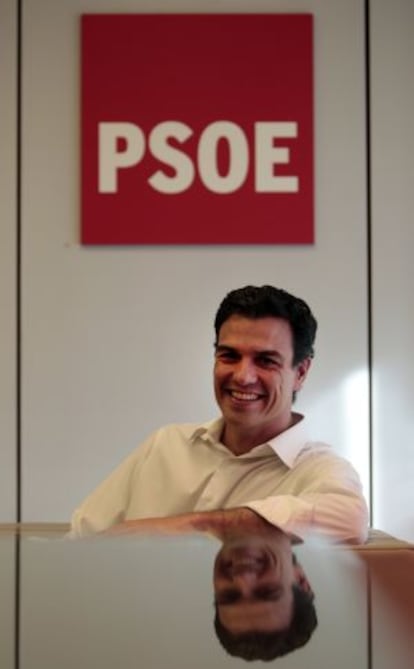“There is going to be an economic transition and democratic renewal”
Pedro Sánchez, voted new secretary general of the Socialist Party, discusses plans for reform

It has only been a few hours since Pedro Sánchez, 42, received the votes of 65,000 Socialist Party members and became the party’s new secretary general.
Events have been moving fast for a man who was virtually unknown to the public until a few days ago, but will soon head one of Spain’s two largest political parties.
Sánchez, a deputy in Congress for Madrid, joined the Socialist Party (PSOE) in 1993. Seven months ago, he told his wife Begoña that he was planning to run in the first-ever party primaries with an open vote. Her reply was: “Go for it.”
The new party leader greets EL PAÍS inside an office he has borrowed from the outgoing secretary, veteran party member Alfredo Pérez Rubalcaba, who decided to step down after the party's poor showing in European elections on May 25.
Question. Does your stated desire to return the Socialists to power mean a drift to the political center or to the left?
Answer. I claim the space on the left, which belongs to the Socialist Party, a party that has been able to attract center votes in the past and must continue to do so.
Q. Did the people who voted for you ask you to restore the party’s leftist signs of identity?
I will work to bring back the kind of Socialist Party that used to get 11 million votes”
A. What the party wants is to win elections, and it also wants a new form of organization. Its concerns coincide with the concerns of much of Spanish society.
Q. What would you say to the 50 percent of party members who voted for either Eduardo Madina or José Antonio Pérez Tapias instead of you?
A. That I will be a secretary for everyone.
Q. And how does that translate into specific measures?
A. It means returning the power of decision to the grassroots members, it means making leaders accountable to one another, it means rejuvenating the organization and giving a bigger role to women and young people.
Q. Does the economic and social model that party members have asked you for coincide with the millions of votes lost by the Socialist Party in previous elections?
A. Party members and society will accept the reformist social democracy that I defend. A lot of talent has left this country, young people are leaving and the over-40 generation is unemployed.
Q. What influence has the new leftist party Podemos had?
A. We need to build a Socialist alternative that brings hope but that also works. We cannot fall into populism and demagoguery, because moves like not paying off the public debt would only make the crisis worse.
A lot of talent has left this country, young people are leaving and the above-40 generation is unemployed”
Q. Has your party been losing elections because of a loss of votes in the political center, or are you losing it everywhere, like in the 2011 general elections?
A. It is true that this happened, but now I will take the party to the left so it can win the elections. There is going to be an economic transition and I also want democratic regeneration.
Q. What do you mean by an economic transition?
A. It will affect Spain and Europe by necessity. We disagree with the policy followed by the European Commission. Its policies only increase inequality.
Q. Do you have any role models in Europe in connection with this quest to turn these policies around?
A. I have two figures of reference in my own party in Spain and in Europe, [former Spanish prime minister] Felipe González and [Italian prime minister] Matteo Renzi. Both bring together two qualities: they are leftist, and they are reformists. I will work to bring back the kind of Socialist Party that used to get 11 million votes.
Q. Do you think that party members will encourage you to run for candidate as Spanish prime minister?
A. What I need to do first is to fulfil my role as secretary general of the Socialist Party.
Q. Does that mean you’re going to run or not?
A. I said during my campaigning that I was running for secretary general in order to change the Socialist Party, with the ambition of changing Spain. I will leave it at that.
Tu suscripción se está usando en otro dispositivo
¿Quieres añadir otro usuario a tu suscripción?
Si continúas leyendo en este dispositivo, no se podrá leer en el otro.
FlechaTu suscripción se está usando en otro dispositivo y solo puedes acceder a EL PAÍS desde un dispositivo a la vez.
Si quieres compartir tu cuenta, cambia tu suscripción a la modalidad Premium, así podrás añadir otro usuario. Cada uno accederá con su propia cuenta de email, lo que os permitirá personalizar vuestra experiencia en EL PAÍS.
¿Tienes una suscripción de empresa? Accede aquí para contratar más cuentas.
En el caso de no saber quién está usando tu cuenta, te recomendamos cambiar tu contraseña aquí.
Si decides continuar compartiendo tu cuenta, este mensaje se mostrará en tu dispositivo y en el de la otra persona que está usando tu cuenta de forma indefinida, afectando a tu experiencia de lectura. Puedes consultar aquí los términos y condiciones de la suscripción digital.









































